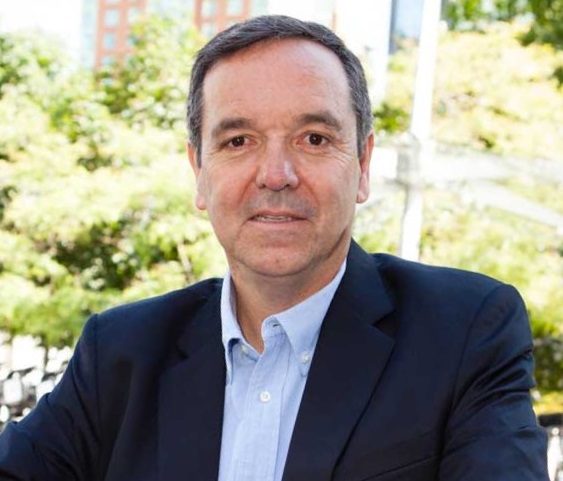
by HEC Team | Jan 26, 2017 | 2017, News
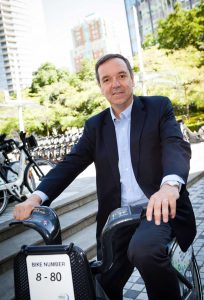
Guillermo Penalosa, Founder & Chair 8 80 Cities
A broader focus has attracted new and captivating speakers to this year’s Maui Energy Conference, to be held at the Maui Arts & Cultural Center, March 22-24. Hosted by the Mayor’s Office of Economic Development and the Maui Economic Development Board (MEDB) the conference theme covers topics from electricity and gas to transportation and water delivery systems.
Keynote speaker, Guillermo (Gil) Penalosa is passionate about cities for all people. He is the founder and Chair of the Board of 8 80 Cities, an internationally recognized non-profit organization based in Canada that was created on the philosophy that if you created a great city for an 8 year old and an 80 year old, you will create a successful city for all people.
Gil is also chair of World Urban Parks, as well as senior adviser to Children & Nature, Vision Zero Network, and America Walks. His leadership and advice has been sought out in more than 250 different cities across six continents. He advises decision makers and communities on how to create vibrant cities and healthy communities for everyone regardless of age, gender and social, economic, or ethnic background.
“While urban design might not be the first thing you think of when it comes to the Maui Energy Conference,” says Conference Program Committee member, Jonathan Koehn, “Urban design dictates lifestyle, and lifestyle has a huge impact on people’s energy footprint. There are so many ways that the physical infrastructure around us influences our energy choices.”
Another draw for this year’s Conference will be Carol Sim, Environmental Affairs Director at Alaska Airlines. Alaska Airlines has been a leader in the airline industry in utilizing alternative jet fuel. It made history in November flying the world’s first commercial flight using a new sustainable alternative jet fuel made from forest residuals.
Carol Sim will join the panel on Innovations in Transportation, which takes a look at what steps can be taken to create and facilitate a resilient transportation sector.
A new feature for the program will include a number of Case Studies presented in special fifteen minute segments. Boris von Bormann of Mercedes-Benz will share their work with the world’s largest second use battery storage. In efforts to stabilize the grid, Daimler AG, The Mobility House AG and GETEC have joined forces to develop a 13 MWh battery storage project in Germany using a total of 1000 battery systems from second-generation Smart Fortwo electric drive cars.
Hawaii Energy’s case study will highlight a few of their success stories that showcase their commitment to helping small businesses of Hawaii lower operating costs through energy efficiency. Theodore Peck from Holu Energy will present two case studies of commercial on-grid microgrids operational in Hawaii with third party ownership, integrating PV and energy storage systems to create multiple value streams on both sides of the meter.
In a fourth case study presentation, Silver Spring Networks will share details on how its utility customers deliver savings to consumers via AMI and Smart Grid deployments.
The 2017 Maui Energy Conference is shaping up to be a timely and innovative forum as Hawaii transitions to a clean energy economy. Early Bird registration ends on January 31.
Click here for the full program.
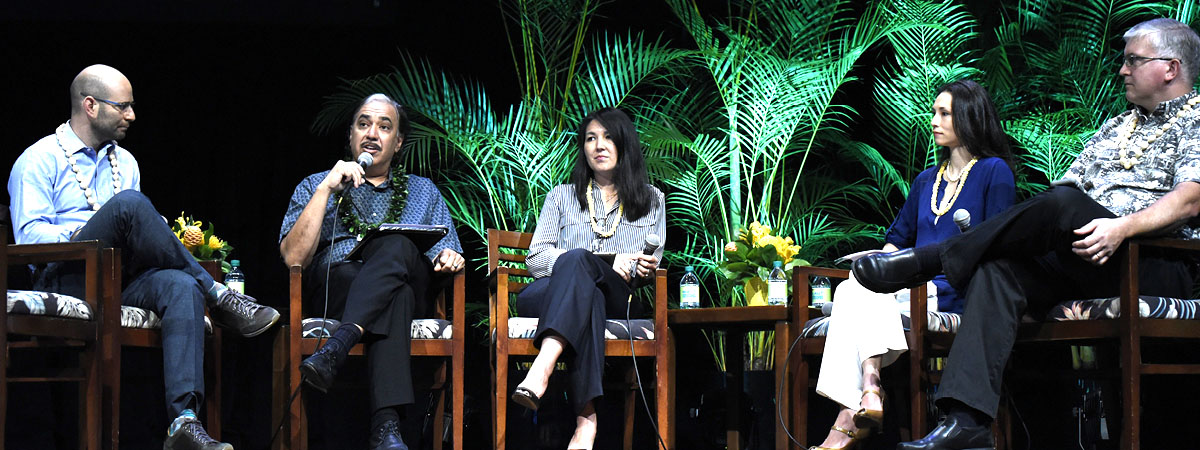
by HEC Team | Dec 19, 2016 | 2017, News
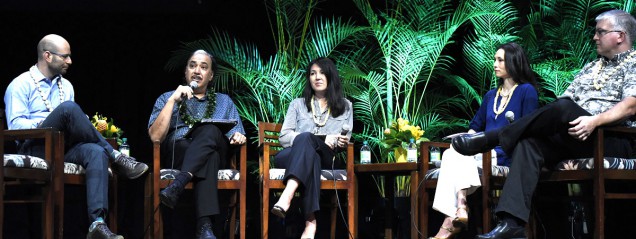
The fourth annual Maui Energy Conference will be held March 22-24, 2017 at the Maui Arts & Cultural Center. The event, hosted by the Mayor’s Office of Economic Development and the Maui Economic Development Board (MEDB), is Hawaii’s leading energy conference. For 2017 the conference theme is ‘All Things Energy: Pursuing Opportunities for Electricity and Beyond.’
From electricity and gas to transportation and water delivery system, all sectors play a vital role in creating the new energy landscape, so this year the Maui Energy Conference broadens its focus.
Hawaii has made substantial progress moving away from fossil fuel sources of electricity. This year we celebrate what has been achieved in the electricity sector but also consider how the lesson learned in that sector can be applied to other types of energy. “Energy experts and stakeholders from across the U.S. will examine groundbreaking strategies, and analyze how concepts like resilience apply beyond the traditional grid,” said Frank De Rego Jr., Director of Business Development Projects at MEDB and member of the conference Program Committee.
One of the new features this year will be a panel discussion on nuclear energy.
“Whatever your adjective is – ironic; surprising; misguided – the argument that nuclear energy is more friendly to the environment is being made across the US. We want our audience to be familiar with the arguments being made at the national level, then add a layer of Hawaii specific information related to our Constitutional provision,” said Program Committee Chair Doug McLeod.
The Session titled “Emerging Trends in Energy Policy: Nuclear Energy – Old Peril or New Promise” seeks to answer the questions: What are the social, cultural, legal, and economic challenges of decarbonization using nuclear energy? Does nuclear energy have a role in Hawaii’s energy future? Gavin Bade from Utility Dive will moderate the panel which will include Henry Curtis, Ililani Media Journalist, Life of the Land Executive and Director of Ka Lei Maile Ali`i Hawaiian Civic Club.
Another change for 2017 will be a discussion of the nexus between food and energy production, using islands as an example.
If an island can go without energy resupply for six months but there is only food for two weeks, can that really be considered “sustainable”? Come join us at a time when the last sugar plantation in Hawaii has just closed and we are working to identify replacements for the energy previously supplied to the grid by the sugar plantation.
The challenge of decarbonizing energy production while maintaining a reliable, safe, affordable, secure, and resilient energy system is formidable. Michael Jung of Silver Spring Networks and Delavane Diaz of the Electric Power Research Institute (EPRI) will help us define resilience and explain how it differs from sustainability.
Rick Rocheleau and Jay Griffin from the University of Hawaii’s Hawaii Natural Energy Institute will present an update on grid resiliency as Hawaii moves towards its ambitious 100% Renewable Portfolio Standards. Several international experts from companies such as Mercedes-Benz and Sumitomo will review case studies from Japan, Germany, and the U.S.
Rajit Gadh, Professor at Henry Samueli School of Engineering and Applied Science and Founder & Director of UCLA Smart Grid Energy Research Center (SMERC) will be speaking on the panel discussing “Technology: The Role of the Smart Grid.”
The Program Committee includes energy experts from Maui, Oahu, Colorado, and California. Our new members for 2017 are Dave Parsons, Director of Policy and Research for the Hawaii Public Utilities Commission, and Lisa Briggs, Manager at Sempra Energy in San Diego.
The exhibition segment of the conference provides networking opportunities to participants who want to generate business or collaborate to address common issues and concerns.

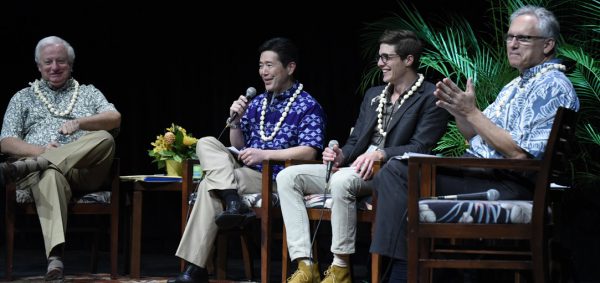
by HEC Team | Dec 7, 2016 | 2017, News
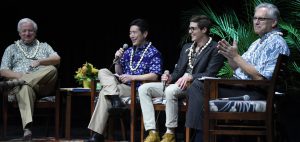 The program for the 2017 Maui Energy Conference is taking shape to explore a vibrant and clean energy future. Local, national, and international experts will tackle the following topics:
The program for the 2017 Maui Energy Conference is taking shape to explore a vibrant and clean energy future. Local, national, and international experts will tackle the following topics:
DAY 1
Resilience
How do we define resilience and sustainability? What do these look like? What strategies will get us to an energy system that is resilient? The challenge of achieving decarbonized energy production and maintaining a reliable, safe, affordable, secure and resilient energy system is formidable.
Water, Energy, Food Security Nexus: Connecting the Dots
We explore the nexus between agriculture production, use of water, and production of energy. With the closure of Hawaii’s last sugar plantation, what role will agriculture play in energy resilience? What are the possibilities for locally produced Biomass and Biofuels? What are the trade-offs in potential food security vs. energy security? In a global marketplace is food or energy security a myth?
Emerging Trends in Hawaii Energy Policy: Are We Sending Mixed Messages?
What market signals are policy makers sending to energy stakeholders? Is it possible to stabilize energy prices and electricity rates, reduce carbon emissions, and provide reliable, safe, affordable, and resilient energy all at the same time? What measures will policy makers implement to protect vulnerable populations?
Emerging Trends in Energy Policy: Nuclear Energy – Old Peril or New Promise
What are the social, cultural, legal, and economic challenges of decarbonization using nuclear energy? Does nuclear energy have a role in Hawaii’s energy future? We will present a critical discussion to address community concerns and fears regarding nuclear energy.
HNEI/GE Update on Renewable Energy Deployment
Hawaii Natural Energy Institute has engaged GE for over a year to address the effects on grid resiliency as Hawaii moves toward 100% renewable energy deployment. The presentation will update us on critical findings and mitigation measures that must be considered. What happens to system operability and reliability? What types of ancillary services will be required?
DAY 2
Creating a Resilient Energy Economy
What are the effects of shifting to a decentralized energy system? What are the impacts on jobs? What opportunities exist to incubate and commercialize new innovative energy entrepreneurs? Can innovative energy rate design and pricing help build a strong economy? How can tax policy and commercial incentives aid in this transition?
Technology: Is Storage the Key to Resilience?
We will discuss specific storage technologies and their contribution to resiliency. Are these systems ready for deployment and cost effective? Do they provide more than one function on the grid? Can customers provide support for their own electrical needs through storage, especially in a Distributed Energy Resources (DER) scenario?
Technology: Role of the Smart Grid
How will the “smart grid” add to grid stability and resiliency? Will the “smart grid” increase exposure to security breaches and what mitigation measures are needed to reduce risk? How can we secure customer’s personal information, including energy usage patterns?
Technology Panel: Innovations in Transportation
What steps can be taken to create and facilitate a resilient transportation sector? Are there unique issues for islands? What are the challenges and expectations in creating a resilient system? What are the costs/benefits of hydrogen, biomass and other alternatives?
Mobility: Getting a Move On
Air, ground, and marine transportation represents more than two thirds of the fossil fuel consumption in Hawaii. We will explore and discuss the opportunities and challenges in the transportation sector. What role can land use and urban planning play in reducing reliance on fossil fuels? What companies are leading in this area? What opportunities are there in the electrification of ground transportation?
The program includes keynote speakers, a session featuring case studies as well as plenty of time for viewing the exhibits and networking.
by HEC Team | Oct 17, 2016 | 2017, News
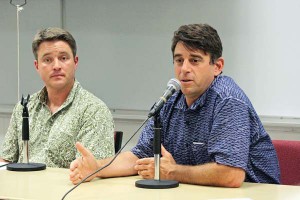
Rising Sun Solar co-owner Brad Albert (right) explains the growing need for energy storage alongside Jamie Cook, Maui Electric Co.’s director of renewable energy projects, during a panel on rooftop solar Thursday at Kaunoa Senior Center. Read the full story on MauiNews.com.






 The program for the 2017 Maui Energy Conference is taking shape to explore a vibrant and clean energy future. Local, national, and international experts will tackle the following topics:
The program for the 2017 Maui Energy Conference is taking shape to explore a vibrant and clean energy future. Local, national, and international experts will tackle the following topics: